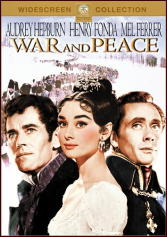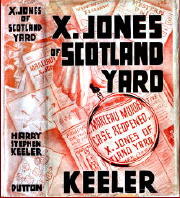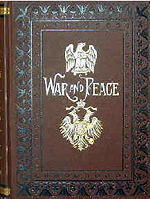Wed 4 Feb 2009
David Vineyard & Walker Martin on CARTER BROWN and WAR AND PEACE.
Posted by Steve under General , InquiriesNo Comments
A recent post on Carter Brown sort of lost its way and led into a discussion of Leo Tolstoy’s War and Peace. Herewith we pick up the comments that ensued about two-thirds the way through. Follow the link to the original post and the comments that produced the exchange below.
First, David L. Vineyard:

You probably know the famous (though no doubt spurious) story regarding War and Peace. Tolstoy intended the book to include all aspects of Russian life, and had labored on it in a effort to reflect that. On the night the books was to go to press he supposedly went to bed satisfied that he had achieved his goal only to sit up in bed in the middle of the night in a cold sweat and trembling.
“What’s wrong?” a frightened Mrs. Tolstoy asked.
“My God,” Tolstoy gasped. “It’s a disaster!”
“What? What’s a disaster?” his wife asked.
“It’s a disaster! I left out the yacht race!”
I think every writer can appreciate the feeling. Hard to believe we started out with Carter Brown. This may be the only time in history a discussion of Danny Boyd and Al Wheeler led to Tolstoy and film criticism.

Still, to bring it back around to the mystery, does anyone know what the longest mystery novel ever published is (not written — I’m sure there are some doorstops in forgotten drawers)?
My guess would be a Victorian Triple Decker or perhaps something by Harry Stephen Keeler.
Though not strictly a mystery my vote would be for Eugene Sue’s Mysteries of Paris that runs to some 1200 pages in the Modern Library translation. But if we limit it to books that were written as part of the genre and for the genre, then I’d be curious to know what the War and Peace of the genre (or the Ben Hur) was.
To which Walker Martin responded:

This of course limits the subject matter and length of the novels, otherwise the mystery audience might not buy the book thinking it too “literary” or not really a mystery, etc.
Mystery/detective fans, for the most part like to see certain formulas and cliches in their stories. For instance the Carter Brown fan likes to see wisecracks, hardboiled action, beautiful women. Same thing with the hardboiled private eye fan. The puzzle lover likes Ellery Queen, John Dickson Carr, Agatha Christie, etc. The cozy lovers, the cat lovers, the spy fiction fans, all have their favorite formula that they like to keep reading about.
There are some readers, like Steve Lewis, myself, and others, who read all types of mystery fiction, though I do lean toward the hardboiled, private eye, wise-cracking type. I think for most mystery readers, they don’t want to read a War and Peace type length mystery novel. They want the usual 150 to maybe 400 page plot concentrating on mystery elements. If other elements enter into the novel, such as the elements in War and Peace, then the novel is no longer a mystery novel and becomes instead a literary or mainstream fiction novel.
So I guess we can find “long” mystery novels like The Long Goodbye by Chandler, etc. But a mystery novel with all the themes that are in War and Peace, then many readers would simply say that’s not a mystery novel. It may have mystery elements and a detective, but only as a part of the main plot, which could be about all sorts of subjects.